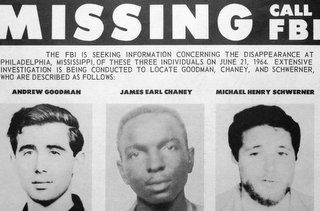Freedom Summer

Freedom Summer
Bruce Watson’s Freedom Summer was published in 2010, but it looks back at the “Mississippi Summer” of 1964 which by all accounts was one of the most important events in the social upheavals in the Long 1960s. Mississippi was one of the most segregated and socially regressive states in the South. There were counties with majority black populations where not a single black vote was cast in elections.
The Student Nonviolent Coordinating Committee organized a “Freedom Summer” in 1964 and invited students from the North and the West to come to Mississippi to participate in concrete nonviolent social activism. After training, the college students dispersed to set up “freedom schools,” encourage blacks to register and vote, and fight against segregation and intimidation. Members of many different marginalized groups came together to advance social progress and racial equality. There was intersectionality which was demonstrated in a particularly memorable scene where a group of students were given a ride to Mississippi by a homosexual.
Most shocking is the story of the three students, Andrew Goodman, James Cheney and Michael Schwerner, who were abducted and murdered right at the beginning of the summer. Presumably this was an attempt to intimidate people from going on, but it did not stop them from continuing. Their martyrdom forced the FBI, which more or less had remained on the sidelines, to become involved in the struggle. And the deaths of Goodman, Cheney and Schwerner focused national attention on the terrible situation in Mississippi and helped bring about the sweeping changes which have since occurred.
Freedom Summer focuses on the experiences of four participants in Chris Williams, Fred Winn, Fran O'Brien, Muriel Tillinghast. By focusing in on individuals and the details of their experiences, the book gives a richer sense of what it must have been like to participate in this dangerous adventure.
The most important thing I learned from this book is how extraordinarily bleak and almost hopeless life must have been for blacks in Mississippi before the progress of the Civil Rights movement. Poverty and Racism were not just endemic throughout the state, but they were institutionalized in the government. The local sheriff was complicit in the murder of Goodman, Cheney and Schwerner and its subsequent cover up.
I really got a feeling of how extraordinarily sad and hopeless it must have been to live in poverty and fear as a black Mississippian in 1964. Your schools were segregated and inferior. You were intimidated so as not to vote. Your church, which represented community connections and whatever small hope you might have for a brighter future, was burned to the ground. The legal and law enforcement system was against you, not for you, and any kind of justice was out of reach. You lived an impoverished life without any hopes for betterment. You faced threats, danger and intimidation if you would make any attempt to vote for change.
This book makes it clear how important the Civil Rights movement was, how progressive and worthwhile the efforts of the 700 students were that long, hot summer over 50 years ago.